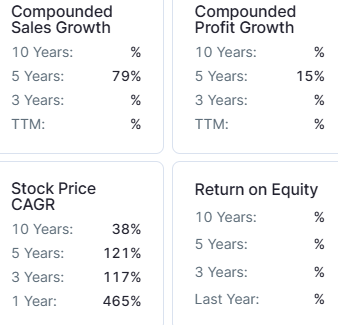Established in 1976, Marsons Ltd. manufacture Distribution & Power Transformers ranging from 10 KVA to 160 MVA 220 kV class. In the last five years, its stock has given a massive return of around 4490% to its investors. Will Marsons continue to provide such great returns in the future as well? Let’s explore Marson’s future growth potential and the Marson’s share price target 2025 to 2050 in this article.
About Marsons

Marsons Limited is an Indian company that started in August 1976. It makes power transformers, which help in sending electricity from one place to another. In 1992, it became a public company, and in 1994, it raised money to grow its business and make bigger transformers. Over the years, Marsons has become well-known for making good-quality transformers for power companies across India.
Marsons Business Model
- Making Transformers: Marsons builds power transformers and sells them to electricity companies and factories.
- Repair and Maintenance: Marsons earns money by fixing and maintaining transformers for customers.
- Special Transformers: Marsons makes custom transformers based on customer needs and charges extra for special designs.
- Service and Support: It provides after-sales support and servicing, which helps bring in more money.
- Selling Parts: The company sells spare parts for transformers, adding to its earnings.
Marsons Fundamental Analysis
| Stock Name | Marsons Ltd. |
|---|---|
| Market Cap | ₹ 2990 Cr. |
| 52W High | ₹ 356 |
| 52W Low | ₹ 37.5 |
| Stock P/E | 4746 |
| Book Value | ₹ -4.00 |
| Dividend Yield | 0.00 % |
| ROCE | – % |
| ROE | – % |
| Face Value | ₹ 1.00 |
| Industry PE | 48.3 |
| Price to book value | – |
| Debt to equity | – |
| PEG Ratio | 312 |
| Quick ratio | 0.25 |

| Shareholders | March 2023 | March 2024 | March 2025 |
|---|---|---|---|
| Promoters | 75.00% | 66.24% | 53.65% |
| DIIs | 0.00% | 0.00% | 0.00% |
| Public | 25.00% | 33.76% | 46.34% |
| No. of Shareholders | 11,588 | 12,955 | 33,014 |
Key Factors Driving Marsons Future Growth
- High Demand for Transformers: Marsons makes transformers, and as electricity use increases, more transformers are needed.
- Government Support: The government is investing in power projects, which creates more business for Marsons.
- Expanding to New Markets: Marsons is trying to sell its products in more cities and countries to grow its business.
- Better Quality Products: Marsons is improving its products to attract more customers and stay ahead of competitors.
- Strong Customer Base: Many companies trust Marsons, which leads to repeat orders and long-term deals.
- Growth in Renewable Energy: Solar and wind power projects need transformers, and Marsons can benefit from this growing industry.
- Skilled Workers: Marsons has experienced engineers and workers who help improve product quality.
- Good Business Partnerships: Marsons works with strong suppliers and distributors, helping it grow faster.
- Urban and Industrial Growth: As cities and industries expand, the need for transformers increases, helping Marsons get more business.
Pros of Marsons Ltd.
- Strong Promoter Confidence: The company’s promoters own 53.65% of its shares, showing their strong belief in the company’s future.
- Significant Market Presence: Marsons has a market capitalization of ₹3,907 crore, indicating its strong position in the market.
- Product Range: Marsons manufactures transformers up to 160 MVA 220 kV class, catering to diverse customer needs.
- Poor Sales Growth – Marsons has delivered a poor sales growth of 79% over the last five years.
Cons of Marsons Ltd.
- High Valuation: Marsons Ltd. has a high Price-to-Earnings (P/E) ratio of 109.73 as of February 21, 2025, indicating the stock may be overvalued compared to its earnings.
- Declining Sales: The company’s sales decreased by 39% in the fiscal year ending March 31, 2024, marking the first revenue drop in three years.
- Low Return on Equity (ROE): The company’s ROE is 3.54%, which is relatively low and may concern investors looking for efficient profit generation.
- Market Capitalization Concerns: With a market cap of ₹2,134.04 crore as of February 21, 2025, the company is considered a small-cap stock, which can be more volatile and risky.
- Historical Performance: Despite a 442.95% increase in share price over the past year, the stock has seen a 27.79% decline in the past month, indicating potential instability.
- Overvaluation Concern: Marsons” stock is trading at a PE ratio of 4,746, which is relatively higher than the industry average of 48.3 , which indicates that the stock is overvalued compared to its peers.
Marsons Ltd Balance Sheet
| Particulars | March 2018 | March 2019 | March 2024 |
|---|---|---|---|
| Equity Capital | 25.00 | 25.00 | |
| Reserves | -74.06 | -94.02 | |
| Borrowings | 86.20 | 84.28 | |
| Other Liabilities | 36.33 | 22.79 | |
| Total Liabilities | 73.47 | 38.05 | |
| Fixed Assets | 24.16 | 20.88 | |
| CWIP | 0.14 | 0.14 | |
| Investments | 0.00 | 0.00 | |
| Other Assets | 49.17 | 17.03 | |
| Total Assets | 73.47 | 38.05 |
By the end of 2025, the Marsons share price is expected to be around ₹225 in normal conditions. In a bear market, it might be ₹220, and in a bull market, it may cross its 52-week high of ₹270.
| Marsons Share Price Target 2025 | Rupees (₹) |
|---|---|
| 1st Target | 220 |
| 2nd Target | 225 |
| 3rd Target | 270 |
In 2026, the Marsons share price is expected to be around ₹275 in a normal situation. In a bear market, it might be ₹260, and in a bull market, it may cross ₹350.
| Marsons Share Price Target 2026 | Rupees (₹) |
|---|---|
| 1st Target | 260 |
| 2nd Target | 275 |
| 3rd Target | 350 |
According to our analysis, the Marsons share price is expected to be around ₹350 in 2027. In a bear market, it might be ₹320, and in a bull market, it may cross ₹456.
| Marsons Share Price Target 2027 | Rupees (₹) |
|---|---|
| 1st Target | 320 |
| 2nd Target | 350 |
| 3rd Target | 456 |
According to our analysis, the Marsons share price may trade near ₹400 by 2028; bearish conditions could pull it down to ₹380, while a strong bull run might lift it to ₹590.
| Marsons Share Price Target 2028 | Rupees (₹) |
|---|---|
| 1st Target | 380 |
| 2nd Target | 400 |
| 3rd Target | 590 |
In a normal situation, the Marsons share price is projected to be approximately ₹490 in 2029. In a bear market, the value may be as low as ₹456, while in a bull market, it may rise to ₹770.
| Marsons Share Price Target 2029 | Rupees (₹) |
|---|---|
| 1st Target | 456 |
| 2nd Target | 490 |
| 3rd Target | 770 |
In a normal situation, the Marsons share price is projected to be approximately ₹600 in 2030. In a bear market, the value may be as low as ₹550, while in a bull market, it may rise to ₹1000.
| Marsons Share Price Target 2030 | Rupees (₹) |
|---|---|
| 1st Target | 550 |
| 2nd Target | 600 |
| 3rd Target | 1000 |
By 2035, the Marsons share price is projected to be around ₹1350 under normal conditions. In adverse markets, the price could fall to ₹1100, while favorable conditions might push it up to ₹3000.
| Marsons Share Price Target 2035 | Rupees (₹) |
|---|---|
| 1st Target | 1100 |
| 2nd Target | 1350 |
| 3rd Target | 3000 |
Under normal conditions, the Marsons share price might hit ₹2550 by 2040. A bearish trend could lower it to ₹2200, whereas a bullish surge could raise it to ₹9000.
| Marsons Share Price Target 2040 | Rupees (₹) |
|---|---|
| 1st Target | 2200 |
| 2nd Target | 2550 |
| 3rd Target | 9000 |
In 2050, the Marsons share price is expected to be around ₹9000 in a normal situation. In a bear market, it might be ₹8800, and in a bull market, it may go up to ₹54000.
| Marsons Share Price Target 2050 | Rupees (₹) |
|---|---|
| 1st Target | 8800 |
| 2nd Target | 9000 |
| 3rd Target | 54000 |
| Years | Target Price |
|---|---|
| Marsons Share Price Target 2025 | ₹220 to ₹270 |
| Marsons Share Price Target 2026 | ₹260 to ₹350 |
| Marsons Share Price Target 2027 | ₹320 to ₹456 |
| Marsons Share Price Target 2028 | ₹380 to ₹590 |
| Marsons Share Price Target 2029 | ₹456 to ₹770 |
| Marsons Share Price Target 2030 | ₹550 to ₹1000 |
| Marsons Share Price Target 2035 | ₹1100 to ₹3000 |
| Marsons Share Price Target 2040 | ₹2200 to ₹9000 |
| Marsons Share Price Target 2050 | ₹8800 to ₹54000 |
Conclusion
Marsons Ltd. has many risks, making it a risky investment. The stock is too expensive, sales are falling, and the company has a lot of debt. The stock price goes up and down a lot, making it unpredictable. The company’s promoters have taken loans against their shares, and it does not pay any dividends, so investors don’t get regular income. Even though Marsons got some big orders, its profits and sales are unstable, and it faces tough competition. No mutual funds have invested in it, which shows big investors don’t trust it. Overall, Marsons Ltd. is a high-risk stock, and investors should think carefully before investing. For more updates, you can visit Marsons Ltd. Official Website.
Disclaimer
This article is for educational purposes only. It is not a stock recommendation and should not be treated as such. Please ask your financial advisor before making any investment decision.

